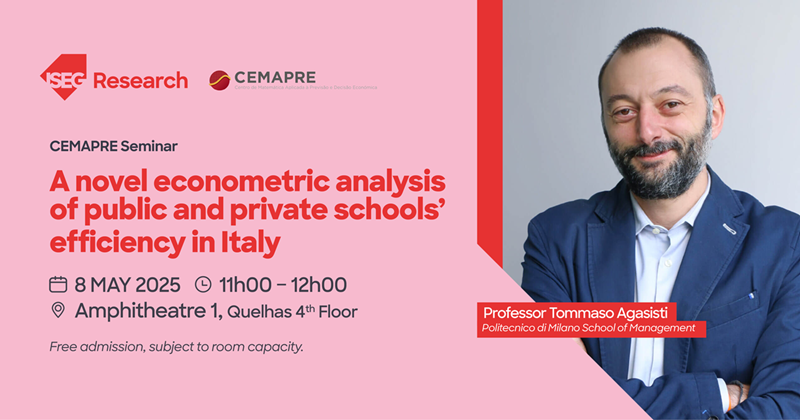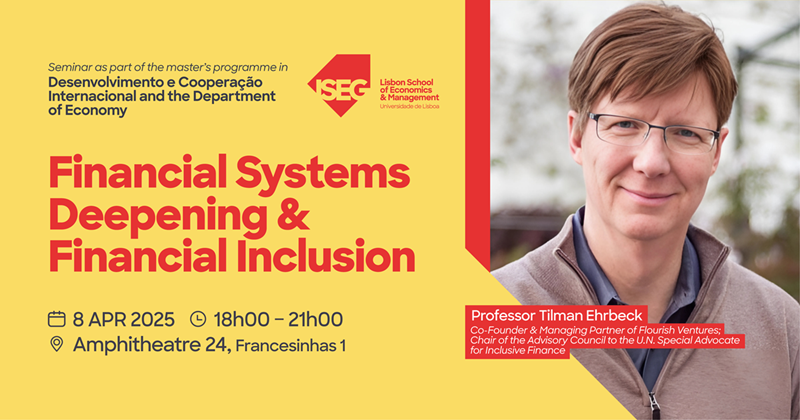O Grupo de Investigação de Estratégia e Marketing do ISEG Research organiza o Webinar “Consumers’ Collective Agency” no dia 13 de maio, entre as 14h00 e as 15h00.
A sessão terá como speaker o Professor Marlon Dalmoro, da Escola de Gestão da Universidade Federal do Rio Grande do Sul (Brasil), sendo proferida em português.
O acesso ao webinar é gratuito, não sendo necessária inscrição prévia.
Assista ao evento no Microsoft Teams, neste link.

O ISEG organiza uma nova sessão dos Seminários de Research a 7 de maio, entre as 13h00 e as 14h00, no Anfiteatro 3 (Edifício Quelhas, Piso 4).
O seminário terá como speaker o Professor Marco Fongoni, da Aix-Marseille School of Economics, que apresentará o paper “Aspirations as Reference Points”, cujo abstract pode ser consultado mais abaixo.
Os seminários de Research do 2º Semestre decorrerão semanalmente até 4 de junho e contarão com a participação de docentes do ISEG e de outras escolas nacionais e internacionais. Saiba mais AQUI.
Entrada livre, limitada à capacidade da sala.
We develop a model of individual effort choice towards the achievement of an outcome, where the individual compares realised outcomes in relation to an aspiration reference point. We provide sufficient conditions for the dual nature of aspirations: moderate aspirations can motivate, but excessively high aspirations can discourage; and for the existence of states in which aspirations are fulfilled. We then study how this non-monotonic relationship between aspirations and effort interact in a dynamic environment when aspirations are endogenous to the individual’s realised outcomes in the past. We show how behavioural traits such as aversion to failure and perseverance can crucially affect an individual’s achievements along the equilibrium path, providing a novel perspective on the dual effect of aspirations on economic behaviour: holding excessively high aspirations can be frustrating, but can also lead to generating strictly better outcomes when individuals particularly dislike failure and are perseverant in the pursuit of their goals.
O OAIP – Observatório de Ação e Inovação Pedagógica organiza o seminário “O AI como coorientador: Ferramentas AI de Produtividade na Investigação“ no dia 8 de maio, entre as 12h30 e as 13h30, no Auditório 4 do ISEG (Edifício Novo Quelhas).
A sessão irá abordar o potencial das plataformas de Inteligência Artificial (como o ChatGPT, entre outras) na realização de investigação, em particular no contexto dos Trabalhos Finais de Mestrado, tendo como speaker o Professor Tiago Cruz Gonçalves.
Entrada livre, limitada à capacidade da sala.
O ISEG acolhe a apresentação do International Monetary Fund Fiscal Monitor – April 2025 no dia 30 de abril, entre as 14h00 e as 15h00, na Sala Novo Banco (Edifício Quelhas, Piso 4).
A apresentação será dedicada ao capítulo “Public Sentiment Matters: The Essence of Successful Energy Subsidies and Pension Reforms” do relatório, cujo abstract pode ser consultado mais abaixo, tendo como oradoras:
A entrada é livre, limitada à capacidade da sala.
O capítulo explora estratégias para aumentar o apoio público a reformas em programas de despesa, como subsídios energéticos e pensões públicas. As reformas visam reduzir vulnerabilidades orçamentais, promover eficiência e crescimento inclusivo, sendo frequentemente desafiadas pela resistência social. Com base em modelos de linguagem aplicados aos media impressos, o capítulo propõe uma métrica inovadora de aceitabilidade das reformas em tempo real. Os resultados sugerem que medidas graduais, implementadas em contextos de maior crescimento, com comunicação estratégica e políticas redistributivas, são melhor recebidas.

O ISEG organiza a sessão plenária “(Des)igualdades de género no mercado de trabalho e nas organizações” no dia 24 de abril, entre as 10h00 e as 12h00, no Anfiteatro 3 (Edifício Francesinhas 2, Piso -1).
A sessão é organizada no âmbito do Seminário da Licenciatura em Economia, tendo como speaker a Professora Sara Falcão Casaca.
Entrada livre, sujeita à lotação da sala.

Os ISEG Research Seminars terão uma nova sessão a 30 de abril, entre as 13h00 e as 14h00, no Anfiteatro 3 do ISEG (Edifício Quelhas, Piso 4).
O evento terá como speaker a Professora do ISEG Alba Miñano-Mañero, que apresentará o paper “City buzz: face-to-face interactions and the urban environment”, cujo abstract pode ser consultado mais abaixo.
Os seminários de Research do 2º Semestre decorrerão semanalmente até 4 de junho e contarão com a participação de docentes do ISEG e de outras escolas nacionais e internacionais. Saiba mais AQUI.
Entrada livre, limitada à capacidade da sala.
We combine mobile phone call and location data from the United Kingdom to examine the relationship between urban form and face-to-face interactions. We define face-to-face interactions as coincidences in space and time of two individuals who know each other, as evidenced by cellphone call records. Our analysis explores how the quantity and variet of these interactions vary with an individual’s urban environment. Crucially, we disentangle the extent to which these patterns result from the sorting of more sociable individuals into denser areas versus the direct influence of urban characteristics themselves.
A próxima sessão dos ISEG Research Seminars terá lugar a 23 de abril, entre as 13h00 e as 14h00, no Anfiteatro 3 do ISEG (Edifício Quelhas, Piso 4).
O evento contará com a participação de Annita Florou, da Universidade Bocconi (Itália), que apresentará o paper “Do Employees Value Defined Benefit Pension Plans? Evidence from Employee Satisfaction Ratings”, cujo abstract pode ser consultado mais abaixo.
Os seminários de Research do 2º Semestre decorrerão semanalmente até 4 de junho e contarão com a participação de docentes do ISEG e de outras escolas nacionais e internacionais. Saiba mais AQUI.
Entrada livre, limitada à capacidade da sala.
Defined benefit (DB) pension plans are an important part of total employee compensation. However, DB pension plans carry risk as they are subject to minimum funding requirements. We examine the effect of a relaxation in pension funding rules on employee satisfaction by exploiting the adoption of the Moving Ahead for Progress in the 21st Century Act (MAP-21). This exogenous regulatory shock reduces minimum required pension contributions and adversely affects employee retirement security. We find that, employees of DB firms (relative to those of non-DB firms) perceive less favourably their firms, overall, and their senior managers, after MAP-21. We also provide evidence that employees are less satisfied with their senior managers only when the latter do not use the MAP-21 pension funding relief in the interest of the former, such as more investments vs shareholder payouts and CEO compensation. The documented negative MAP-21 effects are concentrated in firms where employee interests are most at risk because the labor force is not covered by a collective bargaining agreement and where DB plans are significantly underfunded. Furthermore, the impact of the regulatory shock is driven primarily by current than former employees. Overall, our results are consistent with adverse changes in pension funding rules negatively affecting employee perceptions of managers and firms.
O CEMAPRE/ISEG Research organiza o Seminário “A novel econometric analysis of public and private schools’ efficiency in Italy“, no dia 8 de maio, entre as 11h00 e as 12h00, no Anfiteatro 1 do ISEG (Edifício Quelhas, Piso 4).
O evento contará com a presença do Professor Tommaso Agasisti, do Politecnico di Milano School of Management, que irá apresentar o paper “A Comparative Analysis of Public and Private Schools in Italy (with a Focus on Socioemotional Skills)”, cujo abstract pode ser consultado mais abaixo.
A entrada é livre, sujeita à capacidade da sala.
The present paper considers two main research questions: (i) what is the relative efficiency of Italian public and private schools in recent years? (ii) how does the inclusion of variables measuring the students’ socioemotional skills affect the measurement of schools’ efficiency? By answering these questions, the present paper advances the economic literature in this field in various directions. First, it provides an updated empirical view of the efficiency of public and private Italian schools. The existing studies are dated, and report results from early 2000s – see Barbetta & Turati (2003) and Agasisti (2013). Given the continuing debate about the role of private schools for improving the level of the Italian educational system, it is important to observe if and how they are performing more efficiently than their public counterparts. Recent data and new evidence are needed, and this paper fills this gap. Second, the inclusion of indicators about socioemotional skills in the efficiency measurement of schools is a complete novelty. To the best of our knowledge, no existing academic papers tried to assess schools’ efficiency considering also this dimension, with the notable exception of Vittadini et al. (2022) who, however, limit the empirical exercise to a very small sample of Italian schools in a special Province. Along with the empirical evidence of the effects of including these variables, we develop a theoretical discussion about how better considering SES in modelling schools’ efficiency.
We use data about 1,200 schools (almost 15% are private) from the OECD 2015, 2018 and 2022 editions. We use a bootstrap version of Data Envelopment Analysis as method for the empirical analysis (Simar & Wilson, 1998; 2000). DEA is a non-parametric technique widely adopted in the circumstances of schools’ efficiency measurement (De Witte & Lopez Torres, 2017). To anticipate a preview of the main findings, the results indicate that private schools are statistically more efficient than public ones in all the three waves of PISA analysed. Also, the well-known differences between schools located in North vs South Italy emerge (as in Di Giacomo & Pennisi, 2015), with the former being more efficient than the latter. When considering socioemotional skills in the educational production function, the efficiency differential between private and public schools widens – suggesting that private schools are better than public in developing this set of competences.

O Núcleo de Cultura da ISEG Alumni Económicas organiza a Conferência “Em conversa com Richard Zenith, autor de PESSOA: Uma Biografia”, que terá lugar no dia 8 de abril, entre as 18h30 e as 20h00, no Auditório 3 do ISEG (Edifício Quelhas, Piso 2). Esta será a primeira iniciativa organizada pelo núcleo.
É possível saber quem era Pessoa? Será que o biógrafo é também um fingidor? Estas e outras questões serão decifradas nesta sessão, na qual o editor, ensaísta e tradutor de Fernando Pessoa irá abordar os princípios, os temas e o processo de escrita da sua biografia, seguindo-se um momento de resposta às mais variadas perguntas sobre a vida e obra do poeta-fingidor.
A entrada é livre, limitada à capacidade do espaço.

O ISEG organiza o seminário “Financial Systems Deepening and Financial Inclusion”, no dia 8 de abril, entre as 18h00 e as 21h00, no Anfiteatro 24 do ISEG (Edifício Francesinhas 1).
Este evento é realizado no âmbito do Mestrado em Desenvolvimento e Cooperação Internacional e contará com a participação do Professor Tilman Ehrbeck, Presidente do Conselho Executivo do Advogado Especial das Nações Unidas para as Finanças Inclusivas.
A entrada é livre, limitada à capacidade da sala.
